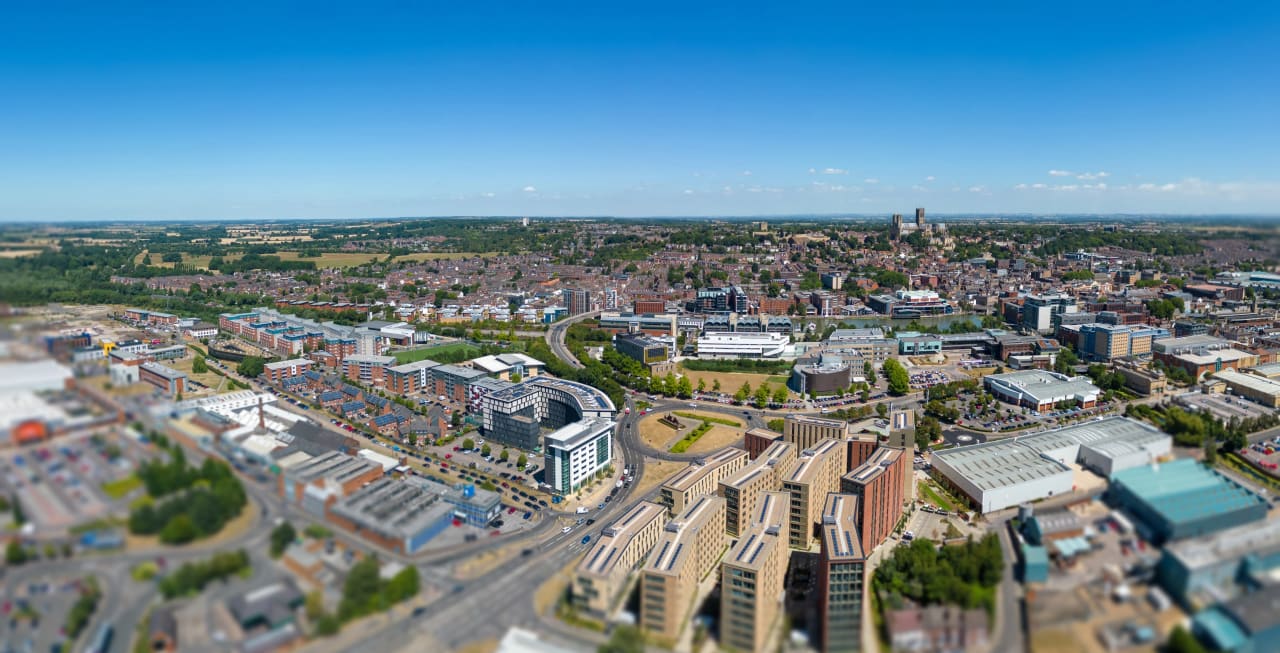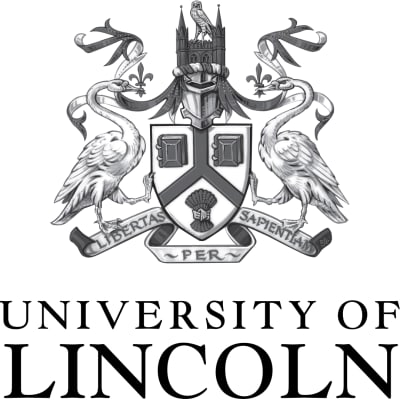
BA (Hons) English and History
University of Lincoln

Key Information
Campus location
Lincoln, United Kingdom
Languages
English
Study format
On-Campus
Duration
3 years
Pace
Full time
Tuition fees
Request info
Application deadline
Request info *
Earliest start date
Request info
* late applications will be considered if suitable vacancies remain
Discover Lincoln Wherever You Are in the World
Our webinars, subject masterclasses, question and answer sessions, and student panel talks are a great way to discover what it is like to live and study at the University of Lincoln.
Introduction
The BA (Hons) English and History programme invites students to study history, combined with literature in English from the medieval period to the 21st Century.
The study of these closely related fields encourages students to analyse a range of literary approaches while exploring questions about the past, enabling them to better understand and interpret the world around them.
Students are able to study a broad range of writers, taking a global approach to the study of literature. They can choose to study periods ranging from the Roman to the modern day, and explore world histories.
"This information was correct at the time of publishing (July 2023)"
Gallery
Admissions
Scholarships and Funding
For eligible undergraduate students going to university for the first time, scholarships and bursaries are available to help cover costs. The University of Lincoln offers a variety of merit-based and subject-specific bursaries and scholarships.
Several scholarship options are available. Please check the university website for more information.
Curriculum
How You Study
This joint honours degree enables students to take an interdisciplinary approach to their studies. Students will benefit from research-led teaching in all modules across the degree.
Students will divide their time, and spread of modules taken, equally between the two subjects. Alongside core modules such as Texts in Time and The Historian's Craft, optional modules could include The Medieval World; Classic and Contemporary Fantasy; Ancient Graffiti; Renaissance Literature and Twenty-First Century Literature.
Modules are taught through a selection of methods from whole-cohort lectures through small-group seminar teaching and workshops to individual tutorials and supervision. Each of these modes is designed to facilitate your learning by developing a range of different approaches to engaging with texts, other types of material, and a variety of methodologies.
In order to "read English" and "read History" at university, students will be expected to read widely in their subjects. This will mean self-guided study and reading in preparation for taught sessions, as will be indicated in the reading lists for each module.
First Year
- Critical Thinking and Writing (Core)
- Forging the Modern State (Core)
- Texts in Time: Medieval to Romantic (Core)
- Texts in Time: Victorian to Contemporary (Core)
- The Historians Craft (Core)
- The Medieval World (Core)
Second Year
- Dis-Locations: the Literature of Late Capitalism (Core)
- New Directions in History (Core)
- Theory Wars (Core)
- 100 Years of Photography: Images, History and Impact 1839-1939 (Option)†
- Accessing Ordinary Lives: Interpreting and Understanding Voices from the Past, 1880 present (Option)†
- Aesthetics (Option)†
- After The End: Reading the Apocalypse (Option)†
- Alexander the Great and his Legacy: the Hellenistic World (Option)†
- American Literature I (Option)†
- American Literature II (Option)†
- Art and Power: Projecting Authority in the Renaissance World (Option)†
- Arthur and His Court (Option)†
- British Medieval Literature (Option)†
- Britons and Romans, 100 BC-AD 450 (Option)†
- Classic and Contemporary Fantasy (Option)†
- Classical Reception: from Medieval to Modern (Option)†
- Digital Heritage (Option)†
- Disease, Health, and the Body in Early Modern Europe (Option)†
- Dissertations and Beyond (Option)†
- Early Modern Family: Households in England c.1500-1750 (Option)†
- Experiencing and Remembering Civil War in Britain (Option)†
- Experimental Writing (Option)†
- Fighting for Peace? Politics, Society and War in the Modern Era (Option)†
- From Bright Young Things to Brexit: British media and society since 1919 (Option)†
- Gender and Sexuality in Britain 1700-1950 (Option)†
- Grand Expectations? America during the Cold War (Option)†
- History and Literature in the C18th and C19th (Option)†
- History of Medicine from Antiquity to the Present (Option)†
- Introduction to Exhibitions, Curatorship and Curatorial Practices (Option)†
- Italy, a Contested Nation (Option)†
- Latin Literature in the Late Republic and the Augustan Age (Option)†
- Literature of the Fin de Siècle (Option)†
- Living and dying in the middle ages, 800-1400 (Option)†
- Madness and the Asylum in Modern Britain (Option)†
- Making It New: An Introduction to Literary Modernism (Option)†
- Material Histories: Objects, Interpretation, Display (Option)†
- Media, Controversy and Moral Panic (Option)†
- Medicine, Sexuality and Modernity (Option)†
- Moral Philosophy (Option)†
- Neoclassicism to Cubism: Art in Transition 1750-1914 (Option)†
- People on the move: migration, identity and mobility in the modern world (Option)†
- Postcolonialism (Option)†
- Power and the Presidency in the United States (Option)†
- Powerful Bodies: Saints and Relics during the Middle Ages (Option)†
- Preventive Conservation (Option)†
- Renaissance Literature (Option)†
- Renaissances (Option)†
- Restoration Literature (Option)†
- Romanticism: Literature 1780-1830 (Option)†
- Salvation and Damnation in medieval and early modern England (Option)†
- Scrambling for Africa? Cultures of Empire and Resistance in East Africa, 1850-1965 (Option)†
- Study Period Abroad - English (Option)†
- Study Period Abroad: History (Option)†
- Teaching History: designing and delivering learning in theory and practice (Option)†
- The Age of Improvement: the Atlantic World in the long eighteenth century (Option)†
- The Birth of the Modern Age? British Politics, 1885-1914 (Option)†
- The Emperor in the Roman World (Option)†
- The Forgotten Revolution? The Emergence of Feudal Europe (Option)†
- The World of Late Antiquity, 150-750 (Option)†
- Themes in American Cultural History (Option)†
- Understanding Exhibitions: History on Display (Option)†
- Understanding Practical Making (Option)†
- Urban Life and Society in the Middle Ages (Option)†
- Village detectives: Unearthing new histories (Option)†
- Women in Ancient Rome (Option)†
- World Heritage Management (Option)†
Third Year
- 'O Bella Ciao' Fascism and Anti-fascism in Italy (Option)†
- A Tale of Two Cities in Medieval Spain: From Toledo to Córdoba (Option)†
- Air War and Society from Zeppelins to Drones (Option)†
- American Detective Fiction and Film: 1930 to the Present Day (Option)†
- Ancient Graffiti (Option)†
- Ancient Philosophy (Option)†
- Arabia in Antiquity: Religion, Culture, and Warfare from the Bronze Age to the Umayyads (Option)†
- Anarchy is order. Anarchism and social movements in Modern Europe (Option)†
- Chivalry in Medieval Europe (Option)†
- Consuming Societies: Western Europe 1600-1800 (Option)†
- Curatorial Practice (Option)†
- Early Modern Cultural and Artistic Encounters: Hybridity and Globalisation (Option)†
- English Landscape Painting: A Social and Cultural History (Option)†
- Eugenics, Race and Reproduction across the Atlantic, 1800-1945 (Option)†
- Exhibiting the World in the Nineteenth Century (Option)†
- From Revolution to New Republic: The United States 1760-1841 (Option)†
- Gothic in Literature and Film (Option)†
- Gothic Visions: Stained Glass in Britain c. 1220-1960 (Option)†
- Growing Up and Growing Old: Youth and Age across the Nineteenth Century (Option)†
- History at the End of the World (Option)†
- History Independent Study Part 2 (Option)†
- History Independent Study Part I (Option)†
- History of Chinese Medicine: Tradition and Modernity (Option)†
- History Work Placement (Option)†
- Imperial Cities of the Early Modern World. (Option)†
- Independent Study: English (Option)†
- Into the Workhouse: Poverty and Society in England and Wales 1780-1929 (Option)†
- Irish Writing since 1900 (Option)†
- Latin Letter-Writing from the Republic to Late Antiquity (Option)†
- Life Writing (Option)†
- Literature and the Environment (Option)†
- Mad or Bad? Criminal Lunacy in Britain, 1800 1900 (Option)†
- Making Militants: Teaching violence in late antiquity (Option)†
- Men, Sex and Work: Sexuality and Gender in 20th Century Britain (Option)†
- Monsters and Violence in Middle English Romance (Option)†
- Newton's Revolution (Option)†
- Objects of Empire: the material worlds of British colonialism (Option)†
- Pre-Raphaelites and Aesthetes: Progressive British Culture (1840-1898) (Option)†
- Queer Film and Television (Option)†
- Race, Media, and Screen Culture in 20th Century Britain (Option)†
- Republicanism in Early Modern England, 1500-1700 (Option)†
- Roman Lincoln (Option)†
- Rome and Constantinople: Monuments and Memory, 200-1200 (Option)†
- Rulers and Kings: Visualising Authority in Medieval Europe (Option)†
- Science Fiction (Option)†
- Sex, Texts and Politics: The Works of Geoffrey Chaucer (Option)†
- Shakespeare I (Option)†
- Shakespeare II (Option)†
- Single Author Study A (Option)†
- Single Author Study B (Option)†
- Teaching History: designing and delivering learning in theory and practice - level 3 (Option)†
- The City and the Citizen: urban space and the shaping of modern life, 1850 to present. (Option)†
- The European Union since 1945 (Option)†
- The Literature of Childhood (Option)†
- The Philosophy and History of Colour (Option)†
- The Roman City (Option)†
- The Roman Countryside (Option)†
- The Vikings in the North Atlantic: Living at the Fringes of Medieval Europe (Option)†
- Twenty-First Century British Fiction (Option)†
- What is the Renaissance? (Option)†
- Womens Writing and Feminist Theory (Option)†
† Some courses may offer optional modules. The availability of optional modules may vary from year to year and will be subject to minimum student numbers being achieved. This means that the availability of specific optional modules cannot be guaranteed. Optional module selection may also be affected by staff availability.
How You Are Assessed
The way in which you will be assessed may vary from module to module. It may include written coursework such as essays, as well as written exams, group work, or presentations.
The University of Lincoln's policy is to ensure that staff return assessments to students promptly, typically within 15 working days.
Program Outcome
How You Study
This joint honours degree enables students to take an interdisciplinary approach to their studies. Students will benefit from research-led teaching in all modules across the degree.
Students will divide their time, and spread of modules taken, equally between the two subjects. Alongside core modules such as Texts in Time and The Historian's Craft, optional modules could include The Medieval World; Classic and Contemporary Fantasy; Ancient Graffiti; Renaissance Literature and Twenty-First Century Literature.
Modules are taught through a selection of methods from whole-cohort lectures through small-group seminar teaching and workshops to individual tutorials and supervision. Each of these modes is designed to facilitate your learning by developing a range of different approaches to engaging with texts, other types of material, and a variety of methodologies.
In order to "read English" and "read History" at university, students will be expected to read widely in their subjects. This will mean self-guided study and reading in preparation for taught sessions, as will be indicated in the reading lists for each module.
Program Tuition Fee
Career Opportunities
English and History graduates may go on to careers in education, the civil service, media, journalism, heritage, publishing, communications, and the arts. They may choose to continue their studies at postgraduate level or take qualifications in teaching.